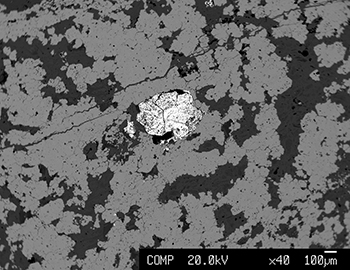
Tredouxite (white) intergrown with bottinoite (light grey),
a complex hydrous alteration product. The large host
minerals are nickel-rich silicate (grey), maybe willemseite,
and the spinel trevorite (dark grey).
More than five thousand minerals have been certified by the International Mineralogical Association (IMA). One of these minerals, tredouxite, was recently named after an academic at the University of the Free State (UFS).
Tredouxite was named after Prof Marian Tredoux, an associate professor in the Department of Geology, to acknowledge her close to 30 years’ commitment to figuring out the geological history of the rock in which this mineral occurs. The name was chosen by the team which identified the new mineral, consisting of Dr Federica Zaccarini and Prof. Giorgio Garuti from the University of Leoben, Austria, Prof. Luca Bindi from the University of Florence, Italy, and Prof. Duncan Miller from the UFS.
They found the mineral in the abovementioned rock from the Barberton region in Mpumalanga, in May 2017.
In the past, a mineral was also named after Marie Curie
With the exception of a few historical (pre-1800) names, a mineral is typically named either after the area where it was first found, or after its chemical composition or physical properties, or after a person. If named after a person, it has to be someone who had nothing to do with finding the mineral.
Prof Tredoux said: “As of 19 September 2017, 5292 minerals had been certified by IMA. Of these, 81 were named after women, either singly or with a near relation. Marie Curie is named twice: sklodowskite (herself) and curite (plus husband). Most of the named women are Russian geoscientists.”
Another way to assess the rarity of such a naming is to consider that fewer than 700 minerals have been named after people. Given that there are by now seven billion people on the planet, it means that a person who is granted a mineral name becomes one in 10 million of the people alive today to be honoured in such a way. To date, over a dozen minerals had been named after South Africans, three of them after women (including tredouxite).
It contains nickel, antimony and oxygen
The chemical composition of tredouxite is NiSb2O6 (nickel antimony oxide). This makes it the nickel equivalent of the magnesium mineral bystromite (MgSb2O6), described in the 1950s from the La Fortuna antimony mine in Mexico.
“This announcement is of great academic importance: the discovery by the Italian team of a phase with that specific chemical composition will undoubtedly help me and my co-workers to better understand the origin of the rock itself,” she said. She also expressed the hope that it may raise interest in the Department of Geology and the UFS as a whole, by highlighting that world-class research is being done at the department.
The announcement of this new mineral was published on the International Mineralogical Association Commission on New Minerals, Nomenclature and Classification website, the Mineralogical Magazine and the European Journal of Mineralogy.